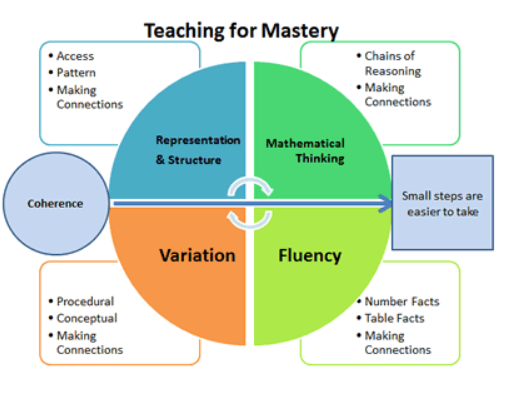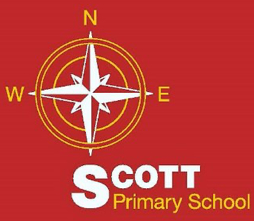Maths
At Scott Primary School we follow a Mastery Curriculum adapting resources from WhiteRose.
The ‘mastery approach’ to teaching maths is the underlying principle of Mathematics Mastery. Instead of learning mathematical procedures by rote, we want pupils to build a deep conceptual understanding of concepts which will enable them to apply their learning in different situations. The programme uses the Concrete Pictorial Abstract (CPA) approach with three main dimensions of depth; conceptual understanding, language and communication and mathematical thinking.

Our successful approach to the teaching and learning of maths, results in a fun and engaging curriculum that embeds understanding and knowledge through hands on, practical activities. Introductions to concepts using concrete materials and practical activities supports learning through memorable activities which children can recall at a later date, relating the learning to new situations. Children are encouraged to share their misconceptions and misunderstandings and become adept in using appropriate vocabulary in doing so. The inclusion of open dialogue to discuss and explain mathematical thinking also strengthens the use and understanding of mathematical language along with ensuring children can explain, justify and evidence their thinking. Connecting maths across the curriculum highlights how maths relates to life. We regularly use and highlight our use of maths in science investigations, collecting, recording and presenting data and geography field trips collecting and categorising resources from the world around us and taking measurements, e.g. Rivers KS2. Computing also highlights the real use of maths with statistics and data collection and analysis while measuring and position and direction are essential skills to programme toys and VEX Robotics (STEM). Special weeks timetabled throughout the year also celebrate mathematical thinking, such as Science Week.
EYFS
Maths is separated into two areas: ‘Number’ and ‘Numerical Patterns’. Children are taught to count confidently, develop a deep understanding of the numbers to 10, the relationships between them and the patterns within those numbers. By providing frequent and varied opportunities to build and apply this understanding – such as using manipulatives, including small pebbles and tens frames for organising counting – children will develop a secure base of knowledge and vocabulary from which mastery of mathematics is built. In addition, our maths curriculum includes rich opportunities for children to develop their spatial reasoning skills across all areas of mathematics including shape, space and measures.
We aim to enable the children to develop positive attitudes and interests in mathematics, look for patterns and relationships, spot connections, ‘have a go’, talk to adults and peers about what they notice and not be afraid to make mistakes!

Numbots
We use Numbots from the end of Reception to the first term in Year 3 so that the children can develop and consolidate their understanding of number. NumBots is all about every child achieving the “triple win” of understanding, recall and fluency in mental addition and subtraction, so that they move from counting to calculating (Numbots Website).
Times Tables
Children are also expected to learn key maths facts like times tables and addition facts by heart to free up working memory and give them the mental space to focus on new concepts. We use Numbots, Times Tables Rock Stars and MyMaths to support the children’s learning and we encourage parents to support them with this at home also.
By the end of Year 4, the children are expected to know all of their times tables up to x12 and the corresponding division facts in any order and rapidly. The Year 4 children will all take part in the National Times Tables Check.
Rolling Numbers
Rolling numbers songs help the children to remember their times tables.
Year 1 – 2s, 5s, 10s
Year 2 – 2s, 5s, 10s, 3s
Year 3 – 2s, 5s, 10s, 3s, 4s, 8s
Year 4 – all numbers to 12
Rolling numbers songs are continued to be used in years 5 and 6 as a simple strategy for recalling times tables but we would expect automatic recall to be the main strategy in these year groups.
Calculation Videos from White Rose- Addition and Subtraction
Year 1
Year 2
Year 3
Year 4
Year 5
Year 6
